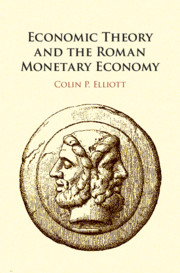Book contents
- Economic Theory and the Roman Monetary Economy
- Economic Theory and the Roman Monetary Economy
- Copyright page
- Dedication
- Contents
- List of Figures
- Preface
- Acknowledgments
- Chapter 1 On Writing Roman Economic History
- Chapter 2 Embedding Contexts of Roman Money
- Chapter 3 Evidence and Theory
- Chapter 4 Rationality, Purposefulness and Action
- Chapter 5 Money Quantity and Quality
- Chapter 6 Understanding Money Use and Value
- Conclusion
- Bibliography
- Index
Chapter 3 - Evidence and Theory
Published online by Cambridge University Press: 03 February 2020
- Economic Theory and the Roman Monetary Economy
- Economic Theory and the Roman Monetary Economy
- Copyright page
- Dedication
- Contents
- List of Figures
- Preface
- Acknowledgments
- Chapter 1 On Writing Roman Economic History
- Chapter 2 Embedding Contexts of Roman Money
- Chapter 3 Evidence and Theory
- Chapter 4 Rationality, Purposefulness and Action
- Chapter 5 Money Quantity and Quality
- Chapter 6 Understanding Money Use and Value
- Conclusion
- Bibliography
- Index
Summary
Roman historians are typically trained under the aegis of Classics or Classical Studies; hence, they find comfort in the world of sources – a preference manifest in a broadly empiricist outlook and an affinity for methods of induction. There are, as this chapter argues, good reasons to question the reliability of traditional empirical approaches to historical questions. Equally, however, the deductive use of formal economic theory has its own drawbacks. Emergent neoclassical and new institutional studies have produced new questions and new insights, but Roman historians’ use of economic theory has also promulgated new anachronisms and perhaps even ‘economics imperialism’. Is Roman economic history doomed to be forever caught in methodological tug-of-wars over the use of economic theory? This chapter suggests that a way forward may be found in the sociological tradition of methodological dualism – a framework which unequivocally draws upon economic theory as a tool of ‘understanding’ rather than of testing or predicting. Methodological dualism is a foundational framework for rethinking the use of economic theory for understanding Roman monetary history.
Keywords
- Type
- Chapter
- Information
- Economic Theory and the Roman Monetary Economy , pp. 51 - 74Publisher: Cambridge University PressPrint publication year: 2020

